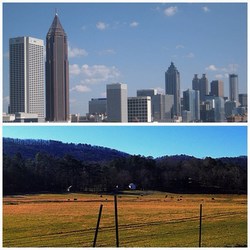 The Atlanta skyline compared to a farm in the rural North Georgia foothills. The Atlanta skyline compared to a farm in the rural North Georgia foothills. I've kicked around several ideas this week about how to start the posts for 2016. You know, I'm trying to set the mood right. I want to mention an idea spurred from a comment on Twitter several days ago. The gist is that human history is not a linear progression from less to greater. Just because things are changing and evolving does not mean that things are necessarily getting better. We seem to have this unchallenged belief that progress is always improvement. It's a lie we've become drunk with until we have trouble seeing the alternative. In the past we've talked about historic and natural preservation. Obviously, we need economic and technical advances on some level to maintain our society. But at what point do we stop and ask ourselves what is an advancement as opposed to what is just something that is flashy or fancy but actually takes away from our quality of life? Let's look at a photo comparison. At first glance, using modern reasoning, one could make an assumption that the top photo is a picture of advanced civilization. A world class city. It's developed. It's modern. It's filled with comforts and amenities and all sorts of gadgets to make our lives easier. On the bottom we see a place of potential. A small home and a few outbuildings would need to be razed in order to properly develop such property. There's some livestock that's probably causing some less than fantastic odors, likely attracting insects, producing fecal matter that isn't quite making it to the advanced sewage treatment facility. There's a rickety barbed wire fence that might be effective at keeping in cows but doesn't meet the standards of our homeowner's association. Maybe if we took out the trees, we could add several homes and a paved two lane road to bring residents in from miles around. Or perhaps, somewhere in one of those lofty towers there is a man. And he is sick and tired of crime, traffic, smog, sports stadiums that need replacing before the concrete cures, corrupt city governments, a twenty minute elevator ride up to the office, and the rat race in general. Suppose he stands up, flips his desk over, and stomps across it and out the office door. Then he walks down past the elevators as his boss screams down the hall at him like a Nazi junior officer under airborne assault. Suppose he keeps walking down to the stairwell and slides down all the banisters, down 67 flights to the parking deck, folds himself into his sports car and squeals out onto Peachtree Street...or Avenue...or Drive...or Place...or Boulevard...or some other paved thoroughfare that hasn't had a peach tree on it since before the war, and speed his way onto I-75...northbound, before rush hour, flying like a greased Saturn V that's been launched from a canon, leaving tire tracks of fire as he escapes the fracas beneath the lanes of 285 as his gas gauge hand drops like the economy as the fuel injectors squeeze more and more processed dinosaur into his European made combustion machine to get as far from that top picture as he can possibly get, as fast as he possibly can. Suppose this little setting in the bottom photo is available for someone with his savings level. Suppose he finds it. Suppose he can see the stars at night. Suppose he can smell the fresh mountain air while he sits on his front porch drinking coffee is the misty morning light. Suppose he can learn, or maybe just remember, how to fish or hunt. Suppose he finds a job he enjoys, something that enables him to maintain the little patch of heaven he has found hidden behind a mountain and safe from bulldozers and shopping mall developers. What if the bottom picture is less "advanced", less cosmopolitan, not as progressed, but it's healthier? What if our test subject is happier and his life is longer and the quality of life he finds is far more valuable than the quantity of life he had in the city? In this scenario, which scene is more advanced? Which scene is more valuable? Progress is not necessarily advancement. Lack of progress is not necessarily barbaric. A shopping mall is not necessarily an improvement. A wooded floodplain is not necessarily a liability. Go back to the top picture and ask yourself how many acres there could be made available for grazing or row crops. Ask yourself if there is a better, more human, more Agrarian use for all that land. Now which setting looks more valuable? We need to be more careful in how we analyze these situations and recognize when things are better left undone.
0 Comments
Leave a Reply. |
Sam B.Historian, self-proclaimed gentleman, agrarian-at-heart, & curator extraordinaire Social MediaCategories
All
Archives
November 2022
|




 RSS Feed
RSS Feed
